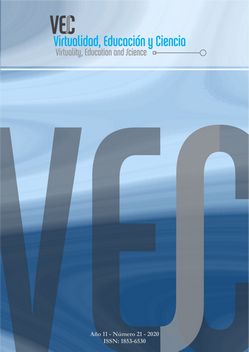Study of the relationship that the first cycle students of technical secondary school students have with digital technologies
DOI:
https://doi.org/10.60020/1853-6530.v11.n21.29436Keywords:
techno-social knowledge, technical secondary school, first cycle.Abstract
We in habit a complex world, expanded and enriched by digital technologies, grounded on the informational paradigm and network structure (Castells, 2002), where young people is building new forms of relationship with the world, particularly with the knowledge. In order to contribute to the construction of knowledge about the relationship about young people and digital technologies, a survey to 505 students of the basic cycle of a technical secondary school in Argentina was carried out. The main dimensions taked into account are: relations with the media, their self perception about the multiple screens, uses, customs, learning and content consumption on the screens and questions about privacy and associated risks. Finally, a series of points of highlighs, derived from the analysis of data, and a link with educational actions that can help improve the teaching experience are presented.
Downloads
References
BORDIGNON, F. (2019) Saberes Digitales en la Educación Primaria y Secundaria de la República Argentina. Espiral, Revista de Docencia e Investigación, (en prensa).
CASTELLS, M. (2002). Epílogo, en HIMANEN, P. La ética del hacker y el espíritu de la era de la información. Barcelona: Destino. pp. 169-191.
GURSTEIN, M. (2003). Effective use: A community information strategy beyond the Digital Divide. First Monday, (8).
ITO, M. (2012) Vivir y aprender con los nuevos medios: Resumen de las conclusiones del proyecto Digital Youth, en: VVAA, La educación expandida. Sevilla: Zemos98.
JENKINS, H. (2008). Convergence Culture. La cultura de la convergencia de los medios de comunicación. Barcelona: Ediciones Paidós Ibérica.
MARTÍN-BARBERO, J. (2003). Saberes hoy: dimensiones, competencias y transversalidades. Revista Iberoamericana de Educación (32). pp. 17-34.
MEIRIEU, P. (2010) Una llamada de atención. Carta a los mayores sobre los niños de hoy. Barcelona: Ed. Ariel.
PEIRONE, F. (2018) Los saberes tecnosociales. Un problema para la teoría social. Encuentro CLACSO, Santiago de Chile.
PEIRONE, F.; DUGHERA, L. y BORDIGNON, F. (2019) Saberes digitales emergentes. Hacía una propuesta de estudio, en FINQUELIEVICH, S.;
FELDMAN, P.; GIROLINO, U. y ODENA, B. (comp.). El futuro ya no es lo que era. Buenos Aires: TeseoPress.
RESNICK, M. (2001). Closing the Fluency Gap. Communications of the ACM, 44(33).
SCOLARI, C. (2018) (Ed.), Alfabetismo transmedia en la nueva ecología de los medios. Libro blanco, Universitat Pompeu Fabra, Barcelona. Recuperado de: https://repositori.upf.edu/bitstream/handle/10230/33910/Scolari_TL_whit_es.pdf?sequence=2&isAllowed=y (22/06/19).
Published
How to Cite
Issue
Section
License
Copyright (c) 2020 Virtuality, Education and Science

This work is licensed under a Creative Commons Attribution-NonCommercial 4.0 International License.
The generation of derivative works is allowed as long as it is not done for commercial purposes. The original work may not be used for commercial purposes.


